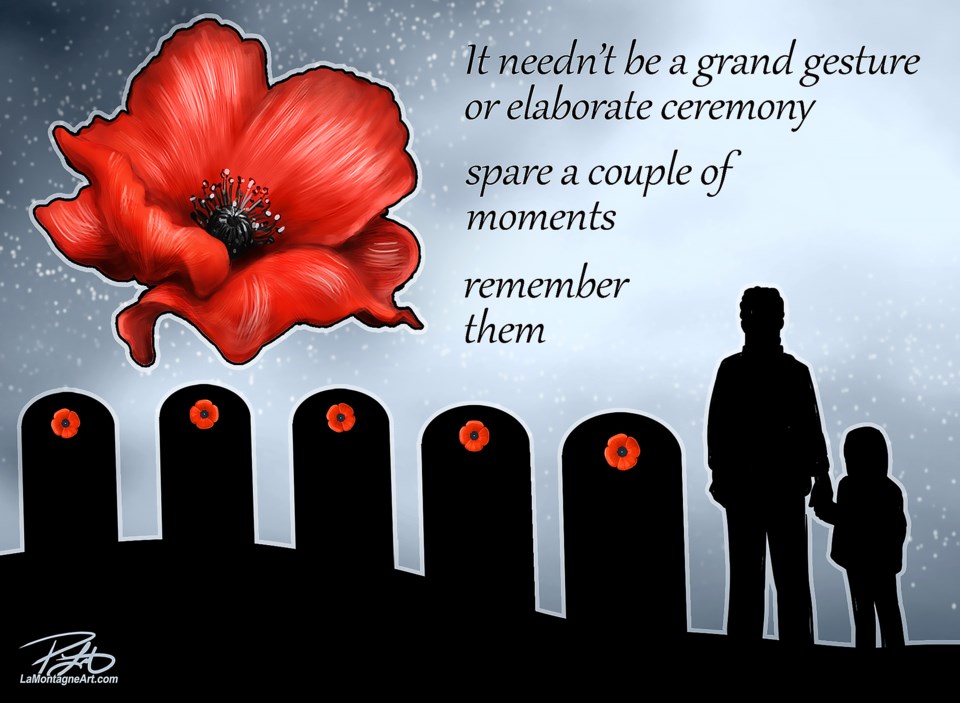The act of remembrance can be a precarious one.
It’s not a regimented guideline, but one that can be unique to each individual as everyone experiences and remembers the past through their own lens.
In Canada, our history – as with any nation – is one of a conflicting nature.
While we celebrate our role in the First and Second World Wars that saw Canadians play a key role in liberating millions of people from brutal German and Japanese occupation, those years were not without derision.
Both wars had internment camps spring up from coast to coast, the War Measures Act banned and censured people and organizations, and further land was taken from First Nations for military use.
National parks such as Banff, Jasper and Yoho each had internment camps during the First World War that saw them construct much of the foundation for basic infrastructure still used to this day.
More than 100 detainees died in camps across the country, which were still open in 1920 – two years after the First World War ended.
In the Second World War, thousands of Japanese-Canadians and Central Europeans were imprisoned in remote camps under the auspices of security of the country.
At the same time, we can remember the significant battles and lengthy campaigns such as Vimy Ridge, the Battle for the Atlantic and the Normandy Landings, but what often falls to the wayside is the day-to-day experiences of combat veterans.
Beyond the initial start of battles is the frequent slog of the path to defeat or victory that leaves hundreds and thousands impacted.
To remember one doesn’t degrade the other, but embraces the conflicting history and moments of a nation. By not remembering one ultimately does more harm in addressing the painful and bitter moments of Canada’s collective memory.
The generations that fought those wars bore the immediacy and intensity of the loss and a need to recognize the sacrifices. The further we get from those wars and fewer who remain alive, that act of remembrance evolves.
Trafalgar Day, Paardeberg Day, Armistice Day were all recognized and observed in Canada at various points in our history and been replaced by Remembrance Day. Indigenous peoples recognize Indigenous Veterans Day, which is observed each Nov. 8.
The world wars stand out for many countries due to the impact and measure both had on populations. They had a further reach and were more transformational than any other war in our history.
The aftermath of the First World War led to proclamations of “the war to end war”, which ultimately lasted 21 years. The Second World War quickly gave way to the Cold War, but led to some of the most prosperous times in human history.
In wars since, it has been more the aftermath that has been remembered.
United Nations peacekeeping missions in places such as Rwanda, Somalia and Cyprus leave a lasting impact on the invisible wounds of post-traumatic stress disorder, while more Afghanistan War veterans have taken their own lives than those killed in the combat mission from 2001-14.
The federal government – regardless of which party has been in power – and Veterans Affairs Canada have largely failed its veterans.
How communities remember fallen soldiers can change within the region. In the communities of Banff, Canmore, Exshaw and Bankhead, 90 locals were killed in the First World War, all remembered with cemeteries, cenotaphs and memorials.
At least 4,250 Indigenous people served in the military in the Second World War, while thousands of Metis and Inuit – who didn’t receive official recognition of their Indigenous heritage – also enlisted.
Stoney Nakoda First Nation member Joe Poucette, who was killed Aug. 15, 1944, while serving with the Royal Winnipeg Rifles, was a little more than 20 when he was killed in the ferocious and pivotal fighting of the Falaise pocket, which effectively ended the Normandy Campaign.
Canadian historian Jonathan Vance, who has extensively studied the act of remembrance in the country, wrote 75 and 100 years ago it was ordinary people who “found themselves in extraordinary circumstances.”
In his book Death So Noble: Memory, Meaning and the First World War, Vance concluded that memory of the war was “sprouted from the grief, the hope, and the search for meaning of a thousand Canadian communities.”
There is no one right way to remember. It’s not the ownership of a specific demographic or organization.
It’s those historical moments that shape us as a country, a community, ethnic groups and as individuals.




